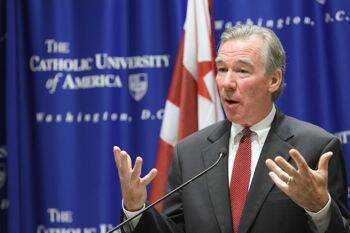John Garvey, president of The Catholic University of America in Washington, announced June 13 that the university would be taking a stand against binge drinking and the "culture of hooking up" by phasing out coed dorms. He likened the move to a "slightly old-fashioned remedy" to combat what he described as the "two most serious ethical challenges college students face." The shift will begin with next year's freshmen, who will be assigned to single-sex residence halls. Garvey made the announcement public in an op-ed piece in The Wall St. Journal where he said the transition will "probably cost more money" and will involve architectural adjustments as well as a change in the ratio of students admitted each year. "But our students will be better off," he wrote. The university president, who has been at the school's helm since last July, also said he knew his proposal was countercultural, citing the fact that more than 90 percent of all college housing is currently coed. Garvey said his decision is supported by recent studies. He noted that according to some studies, students in coed housing are more likely than students in single-sex residences to consume excessive amounts of alcohol, known as binge drinking, and have permissive sexual attitudes or casual sexual relationships referred to as "hooking up."
University Returns to Single-Sex Dorms
Show Comments (
)
Comments are automatically closed two weeks after an article's initial publication. See our comments policy for more.
The latest from america
Do the social networks that Catholic influencers are forming online reflect the values of the Gospel or those of the platform?
Whenever I teach a seminar on T. S. Eliot’s work, I spend the first day of class on ‘Marina.’
The figures represent a huge increase in abortion within a decade, since in 2012 abortion ended 20.84% of conceptions—a fifth of all pregnancies.
Serving life by caring for others is “the supreme law” that comes before all of society’s rules, Pope Leo XIV said in his first Angelus address at the papal summer residence.








